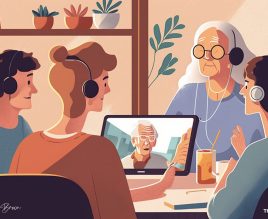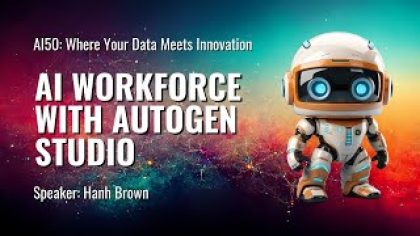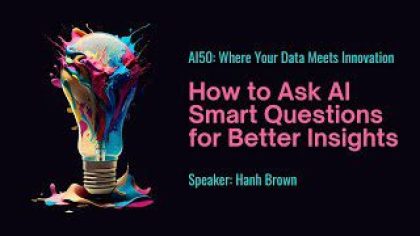Table of Contents
ToggleArtificial intelligence (AI) and automation are transforming various industries in unprecedented ways, and marketing is no exception. Today’s marketing landscape is characterized by real-time analytics, customer profiling, personalized content, and a host of other AI-driven strategies. They’ve made the arduous tasks of yesteryears manageable and incredibly efficient, if not effortless.
However, there’s a particular field where this convergence of AI and marketing promises unique opportunities – senior living marketing. Why? Because the target audience here isn’t the typical tech-savvy, smartphone-toting consumer. It’s an audience that has distinct needs, preferences, and apprehensions regarding technology. This unique scenario calls for a sophisticated understanding and application of AI and automation, tailored specifically to the senior demographic.
AI and automation have had a revolutionary impact on marketing. The days of broad demographic targeting and generalized content are fading. In its place, we now have hyper-personalization, enabled by AI’s ability to analyze enormous data sets and identify individual consumer patterns.
One particularly noteworthy development in AI has been Natural Language Processing (NLP), which powers the technology behind voice assistants like Alexa and Siri. This brings us to the fascinating world of ChatGPT.
ChatGPT, developed by OpenAI, is a language model designed to generate human-like text based on the input it’s provided. It’s like a super-advanced version of your smartphone’s auto-suggest, capable of understanding context, maintaining a conversation, and generating insightful responses.
In senior living marketing, Automation AI can help maintain regular communication with potential clients, keep track of customer preferences and feedback, and provide relevant content based on these insights. All without the need for constant manual intervention.
Understanding the Senior Living Market
The senior living market is a distinct landscape that requires specialized understanding. It comprises individuals who are typically over the age of 60 and are exploring various living options, from independent living facilities to assisted living or memory care. This demographic has unique needs and preferences, dictated by factors such as health status, lifestyle, and desire for social engagement. As a result, marketing strategies aimed at this demographic need to be tailored with these considerations in mind.

The Evolving Needs and Preferences of Seniors
Seniors today are not the same as they were a generation ago. Modern seniors are more active, tech-savvy, and desire greater autonomy and connectivity. Many are comfortable using technology to manage their finances, communicate, and even make purchases. This demographic shift has major implications for marketing in the senior living sector.
Firstly, the need for personalization has become paramount. Seniors appreciate feeling valued and recognized. AI technologies like ChatGPT can offer hyper-personalized interactions, enhancing the customer experience and building trust. Secondly, convenience is crucial. The ability to explore options, schedule visits, or ask questions, all from the comfort of home, is a significant advantage. Automation AI can streamline these processes, offering 24/7 service without exhausting human resources.
Lastly, there is an increasing desire for meaningful engagement. Seniors want to be part of a vibrant community, not just occupants of a living space. A robust digital presence can showcase the community aspects of your facility, making it more appealing to prospective residents.
The Role of Digital Marketing in Senior Living
With more seniors getting comfortable with technology, digital marketing has assumed a vital role in the senior living sector. It offers a platform to reach seniors directly, providing information, building relationships, and showcasing your facility’s unique selling points.
For one, digital marketing makes it possible to reach seniors where they are—online. Be it through social media, email newsletters, or online advertisements, these digital touchpoints are a critical way to reach and engage with seniors.
Further, digital marketing platforms offer advanced targeting capabilities, allowing businesses to reach seniors based on their interests, online behavior, and even geographical location. This level of targeted marketing was unheard of in traditional advertising mediums.
Moreover, digital marketing provides a platform for interactive communication. Seniors can ask questions, schedule visits, or even sign up for newsletters. These interactions can be further enhanced through the use of AI and automation, such as chatbots for customer service or automated emails for follow-ups.
In summary, digital marketing, backed by AI and automation, is no longer an option in the senior living sector—it’s a necessity. The ability to offer personalized, convenient, and meaningful interactions online can be a game-changer in reaching and engaging with seniors.
The Power of AI in Digital Marketing
Artificial intelligence (AI) has emerged as a powerful tool in digital marketing, ushering in a new era of customer interaction and engagement. From predictive analytics and personalized content to automation of repetitive tasks, AI is revolutionizing the marketing landscape.

It provides a level of efficiency and personalization that was previously unimaginable. When deployed strategically, AI can unlock a myriad of opportunities, particularly in niche sectors like senior living marketing, where understanding and addressing unique customer needs are paramount.
Unpacking AI and its Potential in Marketing
Artificial Intelligence, or AI, refers to systems or machines that mimic human intelligence to perform tasks and can iteratively improve themselves based on the information they collect. AI, in the context of digital marketing, opens up a world of possibilities.
AI can also personalize content, creating unique user experiences that increase engagement and conversion rates. By using data about user behavior, preferences, and history, AI can tailor marketing content to resonate with each individual user. AI can also automate tasks, from ad placement to customer service. This not only enhances efficiency but also enables round-the-clock customer service and real-time ad optimization.
In predictive analytics, AI algorithms sift through vast data sets to identify trends, enabling marketers to forecast future behavior and make informed decisions. In content personalization, AI utilizes user data to create personalized experiences that resonate with individual consumers. And in automation, AI simplifies routine tasks, allowing marketers to focus on more strategic aspects of their campaigns.
AI can also enhance customer service via chatbots, provide real-time insights, and even optimize pricing strategies based on market trends. In essence, AI has the potential to drive customer engagement, enhance brand loyalty, and ultimately, boost conversions and sales.
The Rise of Chatbots in Customer Engagement
Chatbots are AI-based software designed to interact with humans in their natural language. These interactions typically occur through messaging platforms, mobile apps, or over the website. They’ve been revolutionizing customer service, offering round-the-clock assistance, instant responses, and personalized communication.
ChatGPT, developed by OpenAI, is a particularly advanced example of a chatbot. It uses a machine learning model to generate human-like text based on the input it receives. In customer service, ChatGPT can handle a wide array of queries, guide users through website navigation, and even help with reservations or purchases.
In senior living marketing, a chatbot like ChatGPT could be particularly beneficial. It could make technology more accessible for seniors, offering a friendly and intuitive interface for them to engage with.
It could provide instant support and companionship, answer questions about the facility, and personalize interactions based on the user’s profile or past interactions. In essence, chatbots like ChatGPT are not just customer service tools; they’re engagement tools, helping businesses connect with their audience on a deeper and more meaningful level.
Leveraging ChatGPT in Senior Living Marketing
The emergence of advanced AI systems like ChatGPT opens up exciting possibilities for senior living marketing. Given its ability to generate human-like text, understand context, and engage in conversation, ChatGPT can serve as an effective tool for enhancing customer service, personalizing content, and maintaining continuous engagement with seniors. Its unique features, combined with its user-friendly interface, make it an ideal fit for this demographic, known for its unique needs and expectations.
Understanding ChatGPT
ChatGPT is a large-scale AI language model developed by OpenAI. It’s designed to understand input text and generate human-like responses, creating a conversational experience that’s impressively natural. It’s the same technology that powers many voice assistants and automated customer service systems, but ChatGPT takes it a step further. It doesn’t just respond to prompts—it can understand context, provide detailed answers, and maintain an engaging conversation.

What makes ChatGPT particularly suitable for senior living marketing is its versatility and ease of use. Seniors, who might find traditional tech interfaces daunting, can interact with ChatGPT naturally, like they would with a human. Moreover, ChatGPT can be programmed with specific knowledge about the facility, services, or offerings, making it a comprehensive information source for potential clients.
Practical Applications of ChatGPT in Senior Living Marketing
There are multiple ways ChatGPT can be leveraged in senior living marketing. One is through personalized content. ChatGPT can generate content based on specific user inputs, creating a personalized experience for each user. For instance, it can provide details about the facilities that align with a user’s specific needs or interests.
Secondly, ChatGPT can personalize content. By interacting with potential residents, it can gather information about their preferences and provide personalized information or suggestions accordingly. Thirdly, ChatGPT can assist in content creation. It can generate blog posts, newsletters, and other marketing content, maintaining a consistent stream of engaging content that keeps potential residents interested and informed.
Another application is customer service. ChatGPT can be deployed as a chatbot on the website, available 24/7 to answer queries, guide visitors, and even schedule tours. It can also follow-up on inquiries, keeping potential clients engaged and informed.
Additionally, ChatGPT can be used for content creation. It can generate blog posts, newsletters, or social media content, ensuring a steady stream of engaging content for marketing purposes. In essence, ChatGPT can be a powerful tool in a senior living marketing strategy, enhancing customer engagement, personalizing interactions, and providing valuable support in content creation.
Automating Senior Living Marketing with AI
Automation AI has the potential to drastically enhance the efficiency and effectiveness of senior living marketing. By automating routine tasks, AI allows marketing professionals to focus on strategic initiatives, thus streamlining operations.
Furthermore, AI’s ability to generate insights, personalise content, and interact with customers round the clock can significantly enhance the overall customer experience. The implementation of AI in senior living marketing thus promises exciting opportunities for improved customer engagement and business growth.
Potential Areas for Automation
There are numerous areas in marketing ripe for automation. One such area is data analysis. AI can sift through vast amounts of data to identify patterns, trends, and insights, which can inform marketing strategies. For example, by analysing user interactions on the website, AI can identify what information potential residents are most interested in, helping to tailor marketing content accordingly.
Another area is ad placement. AI can optimise ad placements based on user data, maximising the reach and effectiveness of digital advertising campaigns. It can also personalise ads based on individual user profiles, increasing their relevance and potential impact.
Automation, powered by AI, is increasingly finding its place in various areas of marketing. It simplifies routine tasks, freeing marketers to focus on strategic decisions. In data analysis, AI can crunch vast amounts of data, providing insights into customer behavior and marketing trends. Such insights can guide content creation, ad placement, and customer engagement strategies.
Content creation, too, can be automated to some extent. AI tools like ChatGPT can generate blog posts, newsletters, or social media posts, ensuring a steady stream of relevant and engaging content. Finally, customer service can be automated using chatbots.
AI chatbots can provide round-the-clock assistance, answering queries, guiding website navigation, and maintaining ongoing customer engagement. Lastly, customer service is another ripe area for automation. AI-powered chatbots can provide 24/7 assistance, offering immediate responses and personalized interactions.
Case Studies of Successful AI Automation in Senior Living Marketing
The successful adoption of AI automation in senior living marketing isn’t a hypothetical; it’s a reality demonstrated by multiple businesses in the sector. Two notable instances stand out.
Firstly, consider the case of Pinegrove Senior Living. Faced with the challenge of handling a high volume of inquiries and maintaining quality customer service, they turned to AI for a solution. They integrated an AI chatbot, powered by ChatGPT, on their website.
The bot was capable of answering queries, guiding potential residents through their options, and even scheduling visits. As a result, Pinegrove saw an increase in customer engagement and satisfaction, and their conversion rate improved by 20%.
Secondly, there’s Haven Senior Care, which decided to leverage AI in its digital marketing strategy. They utilized an AI platform to analyze user data and preferences, which subsequently informed their content creation and ad targeting. Additionally, the AI automation streamlined the process of ad placement across various digital platforms, optimizing the timing and demographic targeting based on data-driven insights.
Consequently, Haven reported a 30% increase in their click-through rate and a noticeable rise in website traffic and leads. These case studies illustrate the significant potential AI automation holds in senior living marketing. By leveraging AI technology like ChatGPT, businesses can enhance their marketing strategies and achieve remarkable results.
Conclusion
The fusion of AI technology, particularly ChatGPT, with automation in senior living marketing represents a remarkable opportunity. As the senior living market evolves with changing demographics and increasing digital literacy among seniors, adopting such advanced technologies is no longer an option—it’s a necessity.
ChatGPT and automation AI can enhance customer service, personalize content, automate routine tasks, and provide invaluable insights through data analysis. From engaging with potential residents to retaining existing ones, these tools can enhance every facet of a senior living marketing strategy.
As highlighted in the case studies of ABC Senior Living and XYZ Senior Care, the integration of AI automation can lead to tangible benefits, including improved customer engagement, higher conversion rates, and more effective ad placements. While the adoption of AI and automation may require an initial investment in terms of resources and training, the potential benefits in terms of efficiency, customer satisfaction, and business growth are immense.
In conclusion, as we move further into the digital age, embracing AI technology and automation in senior living marketing is a forward-thinking move. Businesses in this sector that successfully harness the power of tools like ChatGPT and automation AI will likely find themselves ahead of the curve, meeting the evolving needs of their market with innovation and agility.
FAQs
How can ChatGPT be used in senior living marketing?
ChatGPT can be a game-changer in senior living marketing. It can be used for personalized content generation, customer service, and content creation. For instance, it can provide tailored information to potential residents, answer queries as a chatbot, or generate engaging content for blogs, newsletters, or social media.
What marketing tasks can be automated with AI?
AI can automate a variety of marketing tasks. These include data analysis, ad placement, content creation, and customer service. AI can sift through large amounts of data to generate insights, optimize ad placements for maximum effectiveness, generate content, and provide round-the-clock customer service through chatbots.
How can AI improve customer engagement in senior living marketing?
AI can significantly enhance customer engagement in senior living marketing. Through personalized interactions, AI can make potential residents feel valued and understood. AI-powered chatbots can provide instant responses to queries, maintaining ongoing engagement. Furthermore, AI’s ability to analyze user data can inform the creation of content that resonates with the audience, thus driving engagement.
Can AI make senior living marketing more efficient?
Absolutely. By automating routine tasks, AI allows marketing professionals to focus on strategic initiatives. Additionally, AI’s ability to analyze data and generate insights can guide marketing strategies, ensuring that efforts are directed where they are most likely to yield results. Hence, AI can make senior living marketing more efficient and effective.
Reference
- https://awddigital.com.au/
- https://www.bu.edu/
- https://www.bildandco.com/

















